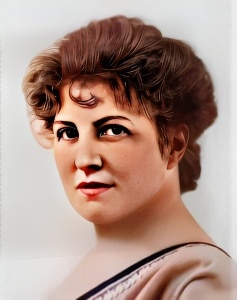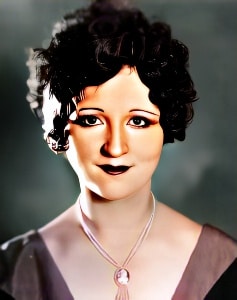 Louise Glaum, a prominent actress of the early silent film era, left an indelible mark on the history of American cinema.
Louise Glaum, a prominent actress of the early silent film era, left an indelible mark on the history of American cinema.
Born on September 4, 1888, in Baltimore, Maryland, she embarked on a career that spanned the transition from silent films to sound cinema, showcasing her adaptability and talent as an actress.
During the early 20th century, silent films were at the forefront of entertainment, relying on nonverbal acting and visual storytelling to convey emotions and narratives. This medium demanded actors to engage with audiences primarily through facial expressions and physical movements, a challenge that Louise Glaum embraced with finesse.
One of the remarkable aspects of Louise Glaum’s career was her ability to portray a wide range of characters, from heroines to villains, showcasing her versatility as an actress. She had a captivating presence on screen, and her performances were known for their authenticity and emotional depth, making her a compelling figure in the world of silent cinema.
Glaum’s breakthrough came with her role as ‘Panthea Vyne’ in “The Wolf Woman” (1916), a film that highlighted her ability to portray complex and morally ambiguous characters. This role established her as one of the prominent actresses of her time and underlined her knack for bringing depth to her characters.
One of her most iconic works was in “Sex” (1920), directed by Fred Niblo. This controversial silent film explored themes of sexuality, morality, and societal norms. Glaum’s role in this film was daring for its time and garnered significant attention. Her performance showcased her ability to engage with complex and challenging subject matter, contributing to the film’s notoriety.
The transition to sound films marked a significant shift in the film industry, posing challenges for many silent film actors. Louise Glaum’s adaptability allowed her to successfully navigate this transition, emphasizing her commitment to her craft.
While her name may not be as widely recognized today as some of the leading actors of her time, Louise Glaum’s contributions to early cinema remain a testament to her talent and dedication as an actress. Her performances in silent films and her seamless transition to sound films underscore her versatility and enduring commitment to her craft.
In conclusion, Louise Glaum, a versatile actress of the silent film era, is known for her captivating performances, including her role in the film “ Hell’s Hinges” (1916), which highlighted her ability to engage with complex characters and emotionally charged narratives. Her ability to portray a wide range of characters and her readiness to tackle challenging roles highlighted her talent and dedication. While her name may not be as widely recognized today, her performances and contributions to the art of storytelling continue to be celebrated as an integral part of the rich history of early Hollywood.




